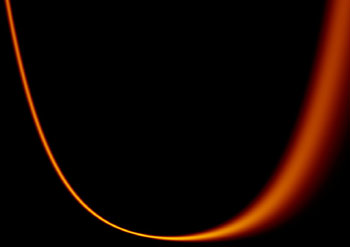This article is more than 1 year old
Loopy quantums reveal successive universes
Big Bang was Big Bounce
So it turns out that the universe didn't begin with a big bang, after all. No. It was a big boing, the result of a previous universe contracting before bouncing back out to become ours. This is the latest news from the mutantly clever quantum cosmologists at Penn State university.

Spreading through a bounce: A state that initially has small
fluctuations (left) bounces and develops larger fluctuations (right).
Time proceeds along the horizontal axis, with the volume plotted
vertically. Credit: Martin Bojawald, Penn State
The boffins have have used a piece of mathematical trickery called Quantum Loop Theory to go where no one has gone before: into the singularity that classical cosmology says preceded the Big Bang. What they found was that the singularity actually wasn't.
Using quantum loop theory, they traced time backwards to its beginning. Where Einstein's theory of general relativity predicts a singularity, quantum loop theory does not. The universe, they say, did not spring forth from a place where infinite density and energy inhabited zero volume.
"Einstein's Theory of General Relativity does not include the quantum physics that you must have in order to describe the extremely high energies that dominated our universe during its very early evolution," explains Martin Bojowald, lead author and assistant professor of physics at Penn State."But we now have Loop Quantum Gravity, a theory that does include the necessary quantum physics."
He explains that the theory's equations continue to produce valid mathematical results past the point of the classical Big Bang, giving scientists a window into the time before the Big Bounce, and into the previous universe.
In order to explore the physics of the other universe, Bojowald developed a "more precise model" within quantum loop gravity. This revealed that some parameters in the equation are complimentary, making it impossible to learn too much about the earlier universe using this model.
His revised calculations also showed that some parameters that exist in the previous universe do not exist in ours, meaning this previous universe would not have been identical to our own.
He said: "The eternal recurrence of absolutely identical universes would seem to be prevented by the apparent existence of an intrinsic cosmic forgetfulness". ®
